Too much news?
The last week has been unprecedented in global news – although I do feel that every time we see the word unprecedented to refer to current events we’re just tempting fate to make it even worse. Our news has been dominated by crucially important and life-changing stories – the economic turmoil in the UK; the impact of global inflation; the real-life effects of Hurricanes Fiona and Ian on the east coast of Canada and the USA; Putin’s annexation of four more Ukrainian territories; the election of the most right-wing prime minister since Mussolini in Italy and; the suspected nation-state-orchestrated sabotage of the Nord Stream gas pipelines. This has been a busy news week. But beyond the headlines there have been so many other stories, other crises, other issues that in a ‘normal’ week (if there is such a thing anymore) would have demanded our attention.
So this week – I want to do a round-up of what we’ve missed as the world has become an even scarier place for too many people. To remind us all of what else is happening in the world that we’ve missed as we have been glued to the news that is struggling to report on everything that has happened.
- At least 18 journalists have been arrested in Iran for daring to cover the protests which have followed the brutal death of Mehsa Amina, who was beaten by state officials for incorrectly wearing a hijab.
- Prince Mohammed Bin Salman was appointed the Prime Minister of Saudi Arabia by his father, a move seemingly designed to give him an extra layer of legal protection in the ongoing lawsuits relating to the murder of Jamal Khashoggi.
- In an act of extraordinary self-sabotage which will undermine not only the British government’s global soft influence but will also significantly impact the promotion of real news and a free and fair media, the BBC World Service has announced deep cuts to their provision including ending Hindi, Arabic, Persian and Chinese radio services among others.
- Azerbaijan has launched an offensive into Armenia this month, with casualties reported on both sides. Although there is currently a ceasefire, the situation in Armenia looks bleak, with little international attention.
- Border clashes between Kyrgyzstan and Tajikistan have taken nearly 100 lives, with 137,000 people forced to flee the fighting in a week that has marked the worst violence in the area for years.
- The former democratic leader of Myanmar, Aung San Suu Kyi, has had a further three years added to her detention in a closed trial – her total sentence is now 23 years. In addition one of her advisors, the Australian citizen Sean Turnell, has also been sentenced to a three-year prison sentence by the military junta.
- In Zimbabwe, author Tsitsi Dangarembga has been arrested and fined for protesting against the government in the latest sign of a government crackdown against dissent.
- In Hong Kong, a man who attended the British Consulate in order to mark the passing of her Majesty Queen Elizabeth II has been arrested and charged with sedition for playing the British national anthem on his harmonica.
- A new report from Global Witness has highlighted the fact that an environmental activist is killed every two days while trying to prevent or expose aggressive forms of industry.
- In numerous states in the USA the impact of the end of Roe v Wade is now being felt. The University of Idaho has issued guidance informing faculty that they must remain neutral on issues relating to abortion or face dismissal – the rights afforded under academic freedom will not extend to this area.
- In the UK the Court of Appeal considered the case of the Colston 4 and the toppling of the statue of Edward Colston in Bristol. The judgement is far from ideal – and removes the human rights defence for future similar acts.
These are just a few of the dozens of stories that many of us missed this week while the world is in turmoil. As ever the role of Index is to make sure that these stories and those of dissidents are not ignored or forgotten.
Read Salman Rushdie from the Index on Censorship archives

Salman Rushdie. Credit: Fronteiras do Pensamento
On 12 August 2022, Salman Rushdie, the author of the book The Satanic Verses, was attacked as he prepared to give a lecture at the Chautauqua Institution, an arts and education centre in New York state.
Index on Censorship has supported Rushdie’s right to express himself ever since he came into the public eye more than three decades ago.
On 14 February 1989 Iran’s Ayatollah Khomeini issued a fatwa ordering Muslims to execute Rushdie over the publication of The Satanic Verses, along with anyone else involved with the novel.
Published in the UK in 1988 by Viking Penguin, the book was met with widespread protest by those who accused Rushdie of blasphemy and unbelief. Death threats and a $6 million bounty on the author’s head saw him take on a 24-hour armed guard under the British government’s protection programme.
The book was soon banned in a number of countries, from Bangladesh to Venezuela, and many died in protests against its publication, including on 24 February when 12 people lost their lives in a riot in Bombay, India. Explosions went off across the UK, including at Liberty’s department store, which had a Penguin bookshop inside, and the Penguin store in York.
Book store chains including Barnes and Noble stopped selling the book, and copies were burned across the UK, first in Bolton where 7,000 Muslims gathered on 2 December 1988, then in Bradford in January 1989. In May 1989 between 15,000 to 20,000 people gathered in Parliament Square in London to burn Rushdie in effigy.
In October 1993, William Nygaard, the novel’s Norwegian publisher, was shot three times outside his home in Oslo and seriously injured.
Rushdie came out of hiding after nine years, but as recently as February 2016, money has been raised to add to the fatwa, reminding the author As that for many the Ayatollah’s ruling still stands.
As his supporters around the world, including Index, pray for a positive outcome, we highlight key articles from our archives from before, during and after the issue of the fatwa, including two from Rushdie himself.
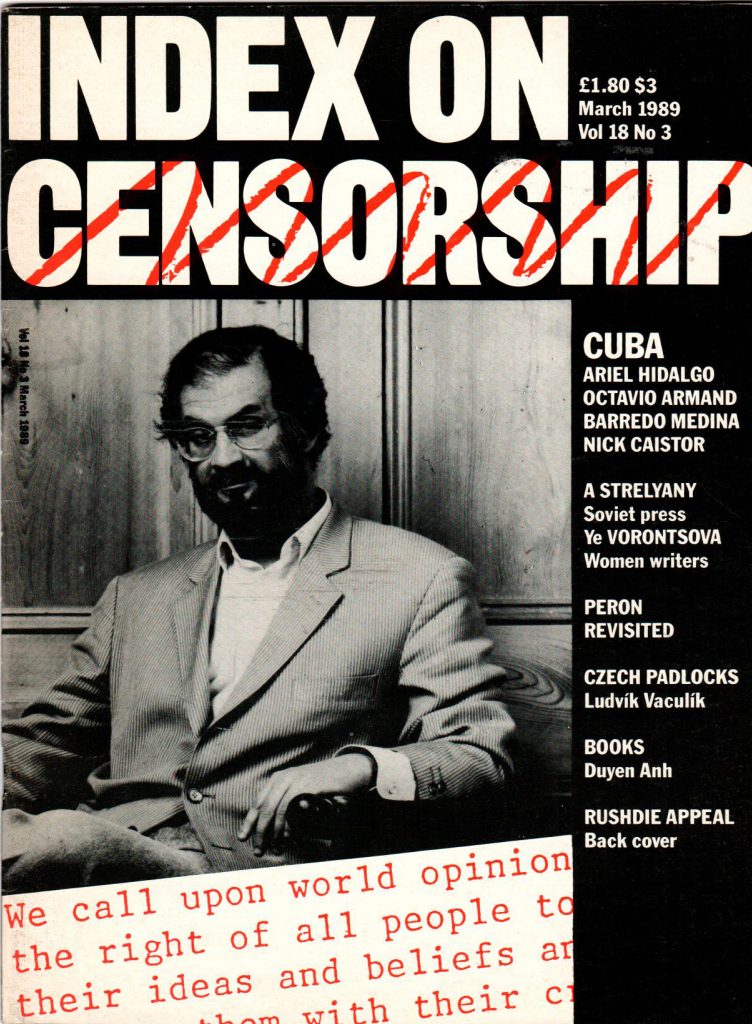
Cuba today, the March 1989 issue of Index on Censorship magazine.
World statement by the international committee for the defence of Salman Rushdie and his publishers
March 1989, vol. 18, issue 3
On 14 February the Ayatollah Khomeini called on all Muslims to seek out and execute Salman Rushdie, the author of The Satanic Verses, and all those involved in its publication. We, the undersigned, insofar as we defend the right to freedom of opinion and expression as embodied in the Universal Declaration of Human Rights, declare that we also are involved in the publication. We are involved whether we approve the contents of the book or not. Nonetheless, we appreciate the distress the book has aroused and deeply regret the loss of life associated with the ensuing conflict.

Islam & human rights, the May 1989 issue of Index on Censorship magazine.
Amir Taheri
May 1989, vol. 18, issue 5
‘What Rushdie has done, as far as Muslim intellectuals are concerned, is to put their backs to the wall and force them to make the choice they have tried to avoid for so long’. Last year, when poor old Mr Manavi filled in his Penguin order form for 10 copies of Salman Rushdie’s third novel, The Satanic Verses, he could not have imagined that the book, described by its publishers as a reflection on the agonies of exile, would provoke one of the most bizarre diplomatic incidents in recent times. Mr Manavi had been selling Penguin books in Tehran for years. He had learned which authors to regard as safe and which ones to avoid at all costs.

Islam & human rights, the May 1989 issue of Index on Censorship magazine.
Wole Soyinka
May 1989, vol. 18, issue 5
This statement is not, of course, addressed to the Ayatollah Khomeini who, except for a handful of fanatics, is easily diagnosed as a sick and dangerous man who has long forgotten the fundamental tenets of Islam. It is useful to address oneself, at this point, only to the real Islamic faithful who, in their hearts, recognise the awful truth about their erratic Imam and the threat he poses not only to the continuing acceptance of Islam among people of all religions and faiths but to the universal brotherhood of man, no matter the differing colorations of their piety. Will Salman Rushdie die? He shall not. But if he does, let the fanatic defenders of Khomeini’s brand of Islam understand this: The work for which he is now threatened will become a household icon within even the remnant lifetime of the Ayatollah. Writers, cineastes, dramatists will disseminate its contents in every known medium and in some new ones as yet unthought of.
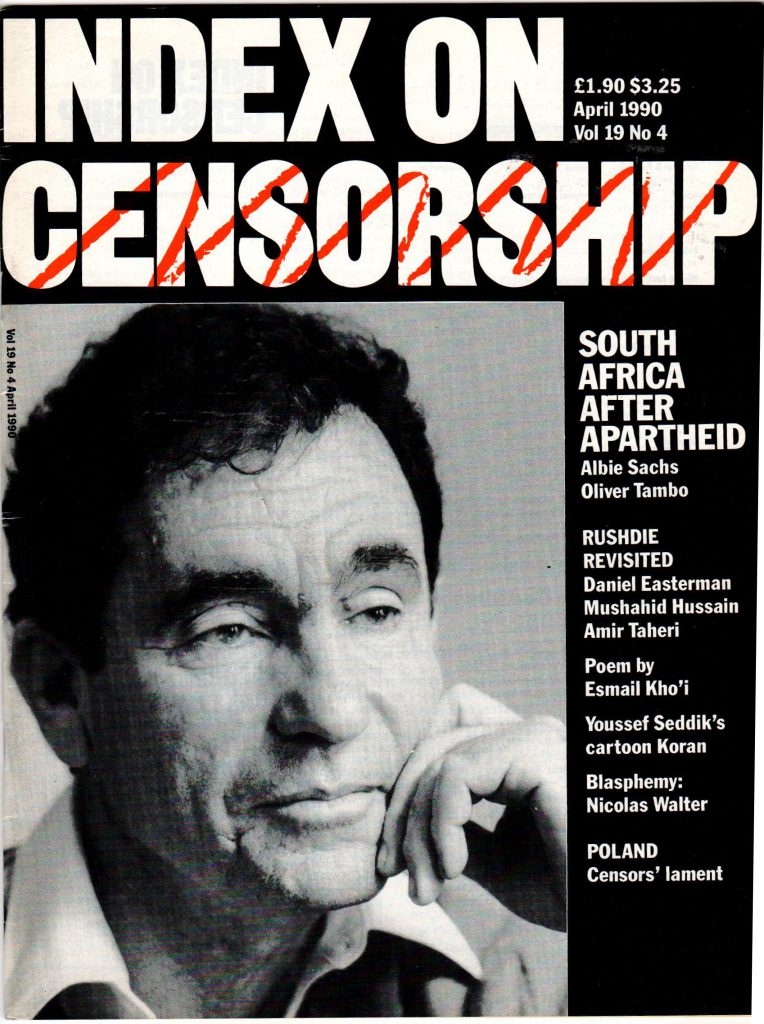
South Africa after Apartheid, the April 1990 issue of Index on Censorship magazine.
Reflections on an invalid fatwah
Amir Taheri
April 1990, vol. 19, issue 4
Broadly speaking, three predictions were made. The first was that Khomeini’s attempt at exporting terror might goad world public opinion into a keener understanding of Iran’s tragedy since the Islamic Revolution of 1979. The fact that the Ayatollah had executed thousands of people, including many writers and poets since his seizure of power in Tehran had provoked only mild rebuke from Western governments and public opinion. With the fatwa against Rushdie, we thought the whole world would mobilise against the ayatollah, turning his regime into an international pariah. Nothing of the kind happened, of course, and only one country, Britain, closed its embassy in Tehran – and that because the mullahs decided to sever.diplomatic ties. In the past twelve months Federal Germany and France have increased their trade with the Islamic Republic to the tune of II and 19 per cent respectively. The EEC countries and Japan have, in the meantime, provided the Islamic Republic with loans exceeding £2,000 million. The stream of European and Japanese businessmen and diplomats visiting Tehran turned into a mini-flood after Khomeini’s death last June.

South Africa after Apartheid, the April 1990 issue of Index on Censorship magazine.
Salman Rushdie and political expediency
Adel Darwish
April 1990, vol. 19, issue 4
When I reviewed Salman Rushdie’s Satanic Verses in September 1988, it never crossed my mind to make any reference to possible offence to Muslim readers, let alone to anticipate the unprecedented international crisis generated in the months that followed. I do not think I was naive – as an LBC radio reporter suggested when she interviewed me at the first public reading from The Satanic Verses in June 1989. On the contrary, I can claim more than many that I am able to understand what Mr Rushdie was trying to say in his book, and the way the crisis has developed. Like Mr Rushdie, I am a British writer, born to a Muslim family. Born in Egypt, I was educated and am employed in Britain, and have been preoccupied and engaged, mainly in the 1960s and 1970s, with the issues that Mr Rushdie has fought for and with which he seemed to be very much concerned in his book.
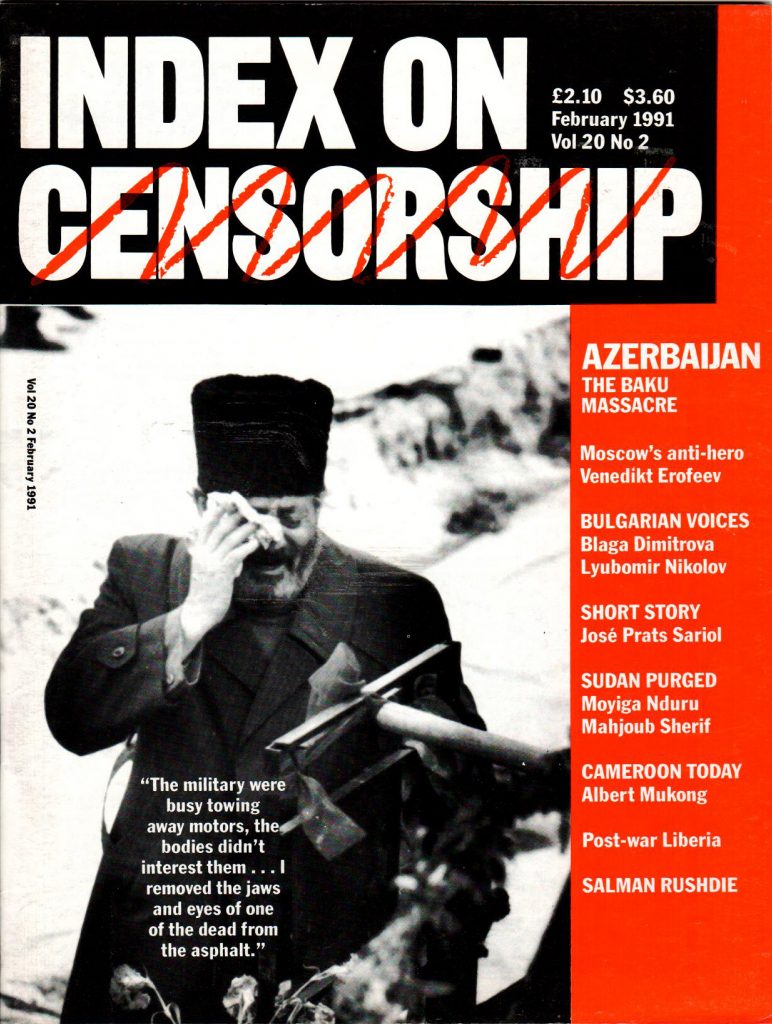
Azerbaijan, the February 1991 issue of Index on Censorship magazine.
Salman Rushdie
February 1991, vol. 20, issue 2
A man’s spiritual choices are a matter of conscience, arrived at after deep. reflection and in the privacy of his heart. They are not easy matters to speak of publicly. I should like, however, to say something about my decision to affirm the two central tenets of Islam — the oneness of God and the genuineness of the prophecy of the Prophet Muhammad —and thus to enter into the body of Islam after a lifetime spent outside it. Although I come from a Muslim family background, I was never brought up as a believer, and was raised in an atmosphere of what is broadly known as secular humanism. I still have the deepest respect for these principles. However, as I think anyone who studies my work will accept, I have been engaging more and more with religious belief, its importance and power, ever since my first novel used the Sufi poem Conference of the Birds by Farid ud-din Attar as a model. The Satanic Verses itself, with its portrait of the conflicts between the material and spiritual worlds, is a mirror of the conflict within myself.
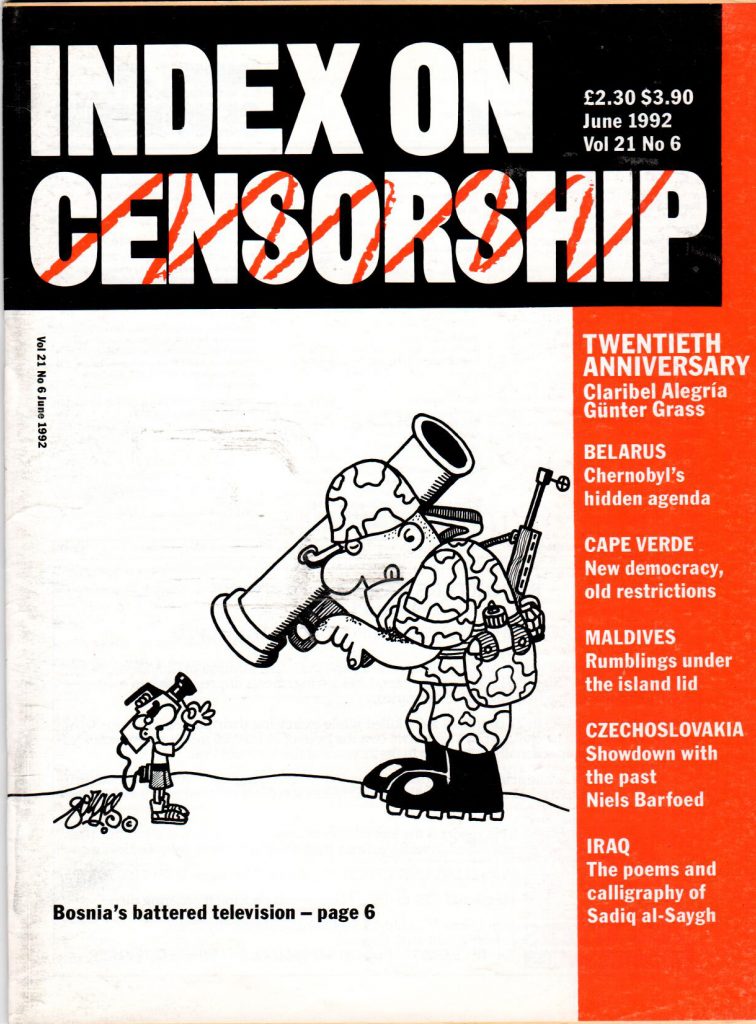
20th Anniversary: Reign of terror, the June 1992 issue of the Index on Censorship magazine.
Gunter Grass
June 1992, vol. 21, issue 6
When George Orwell returned from Spain in 1937, he brought with him the manuscript of Homage to Catalonia. It reflected the experiences he had gathered during the Civil War. At first, he was unable to find a publisher because a multitude of influential, left-wing intellectuals had no wish to acknowledge its shocking observations. They did not want to accept the Stalinist terror, the systematic liquidation of anarchists, Trotskyists and left-wing socialists. Orwell himself only narrowly escaped this terror. His stark accusations contradicted a world image of a flawless Soviet Union fighting against Fascism. Orwell’s report, this onslaught of terrible reality, tarnished the picture-book dream of Good and Evil. A year later, a bourgeois Western publisher brought out Homage to Catalonia; in the areas of Communist rule, Orwell’s works – among them the bitter Spanish truth – were banned for half a century. The minister responsible for state security= in the German Democratic Republic, right to its end, was Erich Mielke. During the Spanish Civil War, he was a member of the Communist cadre to whom purge through liquidation became commonplace. A fighter for Spain with an extraordinary capacity for survival.
Read the full article[/vc_column_text][/vc_column][/vc_row][vc_row][vc_column][vc_column_text]

Russia’s choice, the November-December 1993 issue of Index on Censorship magazine.
The Rushdie affair: Outrage in Oslo
Hakon Harket
November 1993, vol. 22, issue 10
The terrorist state of Iran must face the consequences of refusing to lift the fatwa that condemns Salman Rushdie, and those associated with his work, to death. When someone, in accordance with the express order of the fatwa, attempts to murder one of the damned, the obvious consequence is that Iran must be held responsible for the crime it has called for, at least until there is conclusive proof that no connection exists. The shooting of William Nygaard has reminded the Norwegian public of what the Rushdie affair is really about: life and death; the abuse of religion; the fiction of a free mind. This war of terror against freedom of speech is not one we can afford to lose. Since the nightmare clearly will not disappear of its own accord, it must be engaged head-on.

New censors, the March 1996 issue of Index on Censorship magazine.
March 1996, vol. 25, issue 2
This statement is not, of course, addressed to the Ayatollah Khomeini who, except for a handful of fanatics, is easily diagnosed as a sick and dangerous man who has long forgotten the fundamental tenets of Islam. It is useful to address oneself, at this point, only to the real Islamic faithful who, in their hearts, recognise the awful truth about their erratic Imam and the threat he poses not only to the continuing acceptance of Islam among people of all religions and faiths but to the universal brotherhood of man, no matter the differing colorations of their piety. Will Salman Rushdie die? He shall not. But if he does, let the fanatic defenders of Khomeini’s brand of Islam understand this: The work for which he is now threatened will become a household icon within even the remnant lifetime of the Ayatollah. Writers, cineastes, dramatists will disseminate its contents in every known medium and in some new ones as yet unthought of.
The Rushdie affair: Outrage in Oslo
Hakon Harket
November 1993, vol. 22, issue 10
The terrorist state of Iran must face the consequences of refusing to lift the fatwa that condemns Salman Rushdie, and those associated with his work, to death. When someone, in accordance with the express order of the fatwa, attempts to murder one of the damned, the obvious consequence is that Iran must be held responsible for the crime it has called for, at least until there is conclusive proof that no connection exists. The shooting of William Nygaard has reminded the Norwegian public of what the Rushdie affair is really about: life and death; the abuse of religion; the fiction of a free mind. This war of terror against freedom of speech is not one we can afford to lose. Since the nightmare clearly will not disappear of its own accord, it must be engaged head-on.

New censors, the March 1996 issue of Index on Censorship magazine.
March 1996, vol. 25, issue 2
This statement is not, of course, addressed to the Ayatollah Khomeini who, except for a handful of fanatics, is easily diagnosed as a sick and dangerous man who has long forgotten the fundamental tenets of Islam. It is useful to address oneself, at this point, only to the real Islamic faithful who, in their hearts, recognise the awful truth about their erratic Imam and the threat he poses not only to the continuing acceptance of Islam among people of all religions and faiths but to the universal brotherhood of man, no matter the differing colorations of their piety. Will Salman Rushdie die? He shall not. But if he does, let the fanatic defenders of Khomeini’s brand of Islam understand this: The work for which he is now threatened will become a household icon within even the remnant lifetime of the Ayatollah. Writers, cineastes, dramatists will disseminate its contents in every known medium and in some new ones as yet unthought of.

Tolerance and the intolerable, the May 1994 issue of Index on Censorship magazine
Salman Rushdie
May 1994, vol. 23, issue 1-2
When the Balkans War broke out, Rushdie had never been to Sarajevo, but felt that he belonged to it. He imagined a Sarajevo of the mind, whose ruination and torment exiled everyone.
He wrote: “Sarajevo’s truth is that its citizens, who reject definition by religion or confession, who wish to be simply Bosnians, have for their pains been labelled by the outside world as ‘Muslims’. It is instructive to imagine how things might have gone in former Yugoslavia if the Bosnians had been Christians and the Serbs had been Muslims, even Muslims ‘in name only’. Would Europe have supported a ‘Serbian Muslim’ carve-up of the defunct state? It’s only a guess, but I guess that it would not. Which being true, it must also be true that the ‘Muslim’ tag is part of the reason for Europe’s indifference to Sarajevo’s fate.”
Peter Mayer
December 2008, vol. 37, issue 4
As publisher of The Satanic Verses, Peter Mayer was on the front line. He writes here for the first time about an unprecedented crisis:
Penguin published Salman Rushdie’s The Satanic Verses six months before Ayatollah Khomeini issues his fatwa. When we decided to continue publishing the novel in the aftermath, extraordinary pressures were focused on our company, based on fears for the author’s life and for the lives of everyone at Penguin around the world. This extended from Penguin’s management to editorial, warehouse, transport, administrative staff, the personnel in our bookshops and many others. The long-term political implications of that early signal regarding free speech in culturally diverse societies were not yet apparent to many when the Ayatollah, speaking not only for Iran but, seemingly, for all of Islam, issued his religious proclaimation.
Bernard-Henri Lévy
December 2008, vol. 37, issue 4
As publisher of The Satanic Verses, Peter Mayer was on the front line. He writes here for the first time about an unprecedented crisis:
Salman Rushdie was not yet the great man of letters that he has since become. He and I are, though, pretty much the same age. We share a passion for India and Pakistan, as well as the uncommon privilege of having known and written about Zulfikar Ali Bhutto (Rushdie in Shame; I in Les Indes Rouges), the father of Benazir, former prime minister of Pakistan, executed ten years earlier in 1979 by General Zia. I had been watching from a distance, with infinite curiosity, the trajectory of this almost exact contemporary. One day, in February 1989, at the end of the afternoon, as I sat in a cafe in the South of France, in Saint Paul de Vence, with the French actor Yves Montand, sipping an orangeade, I heard the news: Ayatollah Khomeini, himself with only a few months to live, had just issued a fatwa, in which he condemned as an apostate the author of The Satanic Verses and invited all Muslims the world over to carry out the sentence, without delay.
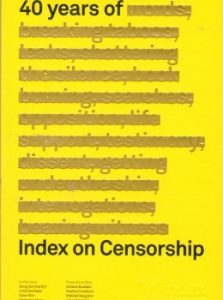
40 years of Index on Censorship March 2012
Salman Rushdie
March 2012, vol. 41, issue 1
Salman Rushdie’s first memories of censorship are cinematic: screen kisses brutalised by prudish scissors which chopped out the moments of actual contact. (Briefly, before comprehension dawned, he wondered if that were all there was to kissing, the languorous approach and then the sudden turkey-jerk away.) The effect was usually somewhat comic, and censorship still retains, in contemporary Pakistan, a strong element of comedy. When the Pakistani censors found that the movie El Cid ended with a dead Charlton Heston leading the Christians to victory over live Moslems, they nearly banned it until they had the idea of simply cutting out the entire climax, so that the film as screened showed El Cid mortally wounded. El Cid dying nobly, and then it ended. Muslims 1, Christians 0.
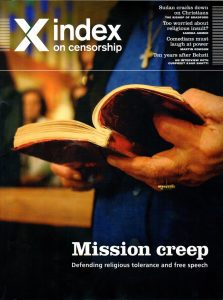
The winter 2013 issue of Index on Censorship magazine.
Defending the right to be offended
Samira Ahmed
December 2013, vol. 42, issue 4
The tensions between freedom of speech and religious belief remain acute – and they are systematically exploited by political groups of all stripes, from the English Defence League to radical Islamists who threaten to disrupt the repatriation of dead British soldiers at Wootton Bassett. The story consistently makes the headlines. The idea that there is an Islamist assault on British freedoms and values is widespread.
The Muslim campaign against Salman Rushdie’s The Satanic Verses in 1988 was the crucial moment in all this. It forced writers and artists from an Asian or Muslim background, whether they defined themselves that way or not, to take sides. They had to declare loyalty – or otherwise – to the offended.
Statement of support for Ukraine
We, the undersigned organisations, stand in solidarity with the people of Ukraine, but particularly Ukrainian journalists who now find themselves at the frontlines of a large-scale European war.
We unequivocally condemn the violence and aggression that puts thousands of our colleagues all over Ukraine in grave danger.
We call on the international community to provide any possible assistance to those who are taking on the brave role of reporting from the war zone that is now Ukraine.
We condemn the physical violence, the cyberattacks, disinformation and all other weapons employed by the aggressor against the free and democratic Ukrainian press.
We also stand in solidarity with independent Russian media who continue to report the truth in unprecedented conditions.
Join the statement of support for Ukraine by signing it here.
#Журналісти_Важливі
Signed:
- Justice for Journalists Foundation
- Index on Censorship
- International Foundation for Protection of Freedom of Speech “Adil Soz”
- International Media Support (IMS)
- Yerevan Press Club
- Turkmen.news
- Free Press Unlimited
- Human Rights Center “Viasna”
- Albanian Helsinki Committee
- Media Rights Group, Azerbaijan
- European Centre for Press and Media Freedom
- Association of European Journalists
- School of Peacemaking and Media Technology in Central Asia
- Human Rights Center of Azerbaijan
- Reporters Without Borders, RSF
- Association of Independent Press of Moldova, API
- Public Association “Dignity”, Kazakhstan
- PEN International
- Human Rights House Foundation, Norway
- IFEX
- UNITED for Intercultural Action
- Human Rights House Yerevan
- Helsinki Citizens’ Assembly – Vanadzor, Armenia
- Rafto Foundation for Human Rights, Norway
- Society of Journalists, Warsaw
- The Swedish OSCE-network
- Hungarian Helsinki Committee
- Legal policy research centre, Kazakhstan
- Public Foundation Notabene – Tajikistan
- HR NGO “Citizens’ Watch – St. Petersburg, Russia
- English PEN
- Public organization “Dawn” – Tajikistan
- International Press Institute (IPI)
- The Union of Journalists of Kazakhstan
- ARTICLE 19
- Human Rights House Tbilisi
- Rights Georgia
- Election Monitoring and Democracy Studies Center, Azerbaijan
- International Service for Human Rights (ISHR)
- Bulgarian Helsinki Committee
- Global Forum for Media Development (GFMD)
- European Federation of Journalists
- Social Media Development Center, Georgia
- Independent Journalists’ Association of Serbia
- OBC Transeuropa
- The Bureau of Investigative Journalism
- Journalists Union YENI NESIL, Azerbaijan
- Media and Law Studies Association (MLSA) , Istanbul
- Baku Press Club
- Centre for Journalism Innovation and Development
- Union Sapari
- The Coalition For Women In Journalism (CFWIJ)
- Committee to Protect Freedom of Expression, Armenia
- FEDERATIA SINDICATELOR DIN SOCIETATEA ROMANA DE RADIODIFUZIUNE, Bucharest, ROMANIA
- CD FILMS (FRANCE)
- CFDT-Journalistes
- Belarusian Association of Journalists
- SafeJournalists network
- Association of Journalists of Kosovo
- Association of Journalists of Macedonia
- BH Journalists Association
- Croatian Journalists’ Association
- Independent Journalists Association of Serbia
- Trade Union of Media of Montenegro
- Analytical Center for Central Asia (ACCA)
- Trade Union of Croatian Journalists
- European Press Prize
- Ethical Journalism Network
- European Journalism Centre
- Slovene Association of Journalists
- Investigative Studios
- PEN Belarus
- Public Media Alliance (PMA)
- Estonian Association of Journalists
- Federación de Sindicatos de Periodistas (FeSP) (Spain)
- DJV, German Journalist Federation
- Free Russia Foundation
- Association for Human Rights in Central Asia – AHRCA
- “Human Rights Consulting Group” Public Foundation, Kazakhstan
- Committee to Protect Journalists
- Ski Club of International Journalists (SCIJ)
- Women In Journalism Institute, Canada – associate of CFWIJ
- Romanian Trade Union of Journalists MediaSind
- Romanian Federation Culture and Mass-Media FAIR, MediaSind
- New Generation of Human Rights Defenders Coalition, Kazakhstan
- Coalition for the Security and Protection of Human Rights Defenders, Activists, Kazakhstan
- Legal policy Research Centre, Kazakhstan
- Eurasian Digital Foundation, Kazakhstan
- Legal Analysis and Research Public Union, Azerbaijan
- German Journalists Union
- Digital Rights Expert Group, Kazakhstan
- Bella Fox, LRT/Bellarus Media, Lithuania
- Syndicat national des journalistes CGT (SNJ-CGT), France
- Karin Wenk, Editor in Chief Menschen Machen Medien
- Press Emblem Campaign
- Federacion de Servicios, Consumo y Movilidad (FeSMC) – UGT (Spain)
- Sindicato dos Jornalistas, Portugal
- International media project Август2020/August2020 (august2020.info), Belarus
- Independent Association of Georgian Journalists (journalist.ge)
- Independent Trade Union of Journalists and Media Workers, Macedonia
- Adam Hug, Director, Foreign Policy Centre
- Zlatko Herljević, Croatian journalist, lecturer of journalism at University VERN, Zagreb, Croatia
- Independent Journalists’ and Media Workers’ Union (JMWU), Russia
- The Daphne Caruana Galizia Foundation
- Hungarian Press Union (HPU), Hungary
- Lithuanian Journalists Union
- National Union of Journalists UK & Ireland
- Federazione Nazionale Stampa Italiana (Italy)
- Dutch Association of Journalists (NVJ)
- Uzbek Forum for Human Rights
- Association of Journalists, Turkey
- Slovak Syndicate of Journalist, Slovakia
- GAMAG Europe (European Chapter of the Global Alliance for Media and Gender)
- Slovenian Union of Journalists (SNS)
- Federación de Asociaciones de Periodistas de España (FAPE)
- Syndicate of Journalists of Czech Republic
- 360 Degrees, Media outlet, North Macedonia
- Frontline, Skopje, North Macedonia
- Community Media Solutions (UK)
- The Norwegian Union of Journalists, Norway
- Rentgen Media (Kyrgyz Republic)
- Union of Journalists in Finland (UJF)
- Syndicat National des Journalistes (SNJ), France
- The Swedish Union of Journalists, Sweden
- Asociación Nacional de Informadores de la Salud. ANIS. España
- Association Générale des Journalistes professionnels de Belgique (AGJPB/AVBB)
- Macedonian Institute for Media (MIM), North Macedonia
- Lithuanian Journalism Centre, Lithuania
- Club Internacional de Prensa (CIP), España
- Periodical and Electronic Press Union
- Fojo Media Institute, Sweden
- Mediacentar Sarajevo
- Media Diversity Institute
- Impressum – les journalistes suisses
- Agrupación de Periodistas FSC-CCOO
- South East European Network for Professionalization of Media (SEENPM)
- TGS, Turkey
- Investigative Journalism Center, Croatia
- Verband Albanischer Berufsjournalisten der Diaspora, Schweiz
- IlijašNet
- Journalists Union of Macedonia and Thrace (Greece)
- The Union of Journalists of Armenia (UJA)
- Associació de Periodistes Europeus de Catalunya (APEC)
- International Association of Public Media Researchers (IAPMR)
- FREELENS e.V. – German Association of Photojournalists & Photographers
- LawTransform (CMI-UiB Centre on Law & Social Transformation, Bergen, Norway)
- Bangladesh NGOs Network for Radio & Communication
- Platform for Independent Journalism (P24), Turkey
- Novi Sad School of Journalism (Serbia)
- Col·legi de Periodistes de Catalunya (Catalunya)

